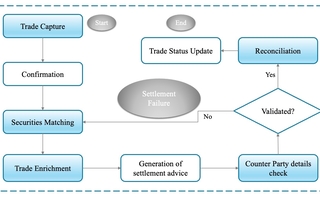This Week: Ice, FCA, HSBC, UBS & more
A summary of the latest financial technology news.

Ice offers ESG coverage on mortgage-backed securities
The Intercontinental Exchange (Ice) has implemented environmental, social and governance (ESG) data coverage on 1.5 million mortgage-backed securities. This increases its total fixed-income coverage to more than 3 million instruments.
Ice’s ESG data solution includes granular, geospatially linked data for residential mortgage-backed securities, agency pools, credit risk transfer pools, and commercial mortgage-backed securities. The solution provides Cusip-linked climate and socioeconomic data for single-family, multi-family, and commercial mortgage-related securities.
Ice’s offering intends to enable market participants to enhance their global equity and fixed-income analysis by incorporating ESG metrics into their research and contextualizing this data.
FCA unveils anti-money laundering strategy
The Financial Conduct Authority (FCA) has released a report detailing its strategy in tackling money laundering for the next three years, from 2022 to 2025. The strategy contains commitments to mitigate fraud, market abuse, money laundering, sanction evasion, and terrorist financing.
The FCA intends to do this by becoming more proactive in its supervision of the market, and pledges to closely scrutinize firms at the authorization gateway to ensure they meet sufficient standards before proceeding further. In the report, the FCA stated that it is “data-led” when it comes to systems and controls, and intends to rely on this element of its functionality to detect financial crime faster and remove FCA-regulated fraudsters from the financial system more effectively.
The report addressed cryptocurrency and its correlation to money laundering in the United Kingdom. The FCA has stated that it will supervise crypto-asset firms’ compliance with anti-money laundering regulations. The connection between suspicious and illegal advertising on social media and fraudulent activity in the financial markets was also raised, and the FCA stated that it will continue to monitor social media platforms for unacceptable activity.
The report affirms that where firms pose harm to consumers or market integrity, they will be brought into question by the FCA.
HSBC delivers counterparty credit risk engine via Google Cloud
HSBC has launched a counterparty credit risk and derivative valuation adjustment engine with its internally developed analytics library, Nola 2.0, and is powered by Google Cloud’s Dataflow, a streaming analytics service that minimizes latency, processing time, and cost through auto-scaling and batch processing.
Banks struggle to manage the calculations necessary for counterparty credit risks or derivative valuation adjustments because these operations often require large compute capacity and billions of daily calculations that help firms understand a financial institution’s counterparty exposure.
HSBC’s cloud-native risk management solution intends to boost calculation speeds and efficiency for firms through its employment of Google Cloud’s Dataflow elastic compute. Nola 2.0 utilizes an Apache Beam open-source pipeline which runs at scale on Dataflow. By speeding up data processing, HSBC is hopeful that the solution could help firms keep up with regulatory obligations in the future.
In addition to this, HSBC is looking to expand its collaboration with Google Cloud to develop additional solutions and extend Nola 2.0 beyond the two trading hubs where it currently operates, London and Hong Kong, to 38 more sites. Though it took 10 months to launch the library from prototype to production in both locations, a timeline for any expansion has not been released.
UBS joins the Green Software Foundation
As part of an ongoing effort to drive sustainable practices and achieve net-zero greenhouse gas emissions by 2050, Swiss bank UBS has joined the Green Software Foundation, a non-profit formed under the Linux Foundation, as a steering member. The foundation’s mission is to create an ecosystem of standards and best practices for building environmentally conscious software.
In recent years, UBS moved from on-premise datacenters to the cloud and is currently exploring the prospect of carbon-aware applications that allow users to select computing options with low emissions. The new partnership between UBS and the Green Software Foundation is meant to assist the bank in searching for means to reduce the emissions from its large technology estate.
The bank’s relationship with the Green Software Foundation will be managed by UBS’s Sustainable Technology Guild, which was formed in 2021 to help deliver on the firm’s “Net Zero by 2050” commitment.
FactSet’s EMS adds integration with Appital’s book-building platform
Appital, a forthcoming buy-side equity trading platform, has integrated with financial research and data provider FactSet on its Portware Enterprise Execution Management System (EMS) to offer clients access to Appital’s book-building platform.
The incorporation of Appital’s book-building platform into FactSet’s Portware intends to give buy-side traders the ability to place large orders or participate in further liquidity opportunities.
FactSet’s EMS provides asset managers and hedge funds with embedded analytics, decision support, and automation to support scale and market participation. The Appital integration could offer buy-side clients additional transparency in executing large orders with minimal market impact or risk of price erosion.
Appital is currently onboarding asset managers onto its platform in preparation for its launch later in 2022.
Through an integration with Appital, buy-side firms will have access to the liquidity of executing on Turquoise, the London Stock Exchange Group’s pan-European multilateral trading facility to multiple settlement venues.
Tradeweb launches AI pricing service for the US municipal bond market
Tradeweb has announced the launch of a new offering, Tradeweb Ai-Price, short for Tradeweb Automated Intelligence Pricing. The offering has been developed for municipal bonds and uses machine learning and data science to calculate daily prices for municipal bonds.
The municipal bond market is worth $4 trillion and plays a critical role in the United States economy. While they are widely held by retail and institutional investors, only 1.9% of tax-free, fixed-coupon municipal bonds were traded on a daily basis during March 2022. This is a relatively low turnover, and could impact price discovery and make it more costly and more time-consuming to buy, sell, or hold these bonds.
Tradeweb’s new solution intends to address this problem through machine learning and additional data science methods to produce reliable pricing levels regardless of trading frequencies.
Tradeweb Ai-Price for municipal bonds will initially publish end-of-day prices for approximately 880,000 securities and custom portfolios, based on data published by the Municipal Securities Rulemaking Board and through trading activity on the Tradeweb platform. Tradeweb is looking to expand the model to calculate intraday price updates, but a timeline for this expansion has not been disclosed.
SteelEye launches replay solution to better spot market abuse
Regtech provider SteelEye has launched its new Order Book Replay service, which has been designed to facilitate more precise surveillance of market abuse.
SteelEye’s market replay tool, which is currently live for clients, enables organizations to playback a trading session and more thoroughly analyze market movements. This could allow for compliance teams to review and scrutinize order book activity to gain a deeper understanding of the actions that have taken place by visually showcasing to clients the overall balance of the book against market price levels and spreads.
Additionally, the solution intends to highlight where trading activity might be indicative of market abuse behaviors like spoofing and layering.
Sagard NewGen enters negotiations to acquire Horizon Software from Capza
Paris-based financial consultant Sagard NewGen has entered into negotiations with Capza to acquire its majority stake in Horizon Software, a financial solutions provider also headquartered in Paris.
Horizon Software’s mission is to provide asset managers with automation for their electronic trading needs. Founded in 1998, it offers a cross-asset, SaaS-based solution that unites equities and derivatives departments and provides principal and agency traders with native trading functionalities and algorithmic capabilities to allow clients to test and implement automated strategies within short timescales.
Only users who have a paid subscription or are part of a corporate subscription are able to print or copy content.
To access these options, along with all other subscription benefits, please contact info@waterstechnology.com or view our subscription options here: http://subscriptions.waterstechnology.com/subscribe
You are currently unable to print this content. Please contact info@waterstechnology.com to find out more.
You are currently unable to copy this content. Please contact info@waterstechnology.com to find out more.
Copyright Infopro Digital Limited. All rights reserved.
You may share this content using our article tools. Printing this content is for the sole use of the Authorised User (named subscriber), as outlined in our terms and conditions - https://www.infopro-insight.com/terms-conditions/insight-subscriptions/
If you would like to purchase additional rights please email info@waterstechnology.com
Copyright Infopro Digital Limited. All rights reserved.
You may share this content using our article tools. Copying this content is for the sole use of the Authorised User (named subscriber), as outlined in our terms and conditions - https://www.infopro-insight.com/terms-conditions/insight-subscriptions/
If you would like to purchase additional rights please email info@waterstechnology.com
More on Emerging Technologies
Quants look to language models to predict market impact
Oxford-Man Institute says LLM-type engine that ‘reads’ order-book messages could help improve execution
The IMD Wrap: Talkin’ ’bout my generation
As a Gen-Xer, Max tells GenAI to get off his lawn—after it's mowed it, watered it and trimmed the shrubs so he can sit back and enjoy it.
This Week: Delta Capita/SSimple, BNY Mellon, DTCC, Broadridge, and more
A summary of the latest financial technology news.
Waters Wavelength Podcast: The issue with corporate actions
Yogita Mehta from SIX joins to discuss the biggest challenges firms face when dealing with corporate actions.
JP Morgan pulls plug on deep learning model for FX algos
The bank has turned to less complex models that are easier to explain to clients.
LSEG-Microsoft products on track for 2024 release
The exchange’s to-do list includes embedding its data, analytics, and workflows in the Microsoft Teams and productivity suite.
Data catalog competition heats up as spending cools
Data catalogs represent a big step toward a shopping experience in the style of Amazon.com or iTunes for market data management and procurement. Here, we take a look at the key players in this space, old and new.
Harnessing generative AI to address security settlement challenges
A new paper from IBM researchers explores settlement challenges and looks at how generative AI can, among other things, identify the underlying cause of an issue and rectify the errors.







